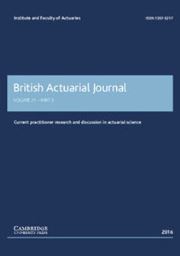Article contents
Pension Scheme Asset Allocation with Taxation Arbitrage, Risk Sharing and Default Insurance
Published online by Cambridge University Press: 10 June 2011
Abstract
The asset allocation is a crucial decision for pension funds, and this paper analyses the economic factors which determine this choice. The analysis proceeds on the basis that, in the absence of taxation, risk sharing and default insurance, the asset allocation between equities and bonds is indeterminate and governed by the risk/return preferences of the trustees and the employer. If the employing company and its shareholders are subject to taxation, there is a tax advantage in a largely bond allocation. Risk sharing between the employer and the employees often means that one group favours a high equity allocation, while the other favours a low equity allocation. Underpriced default insurance creates an incentive for a high equity allocation. When taxation, risk sharing and underpriced default insurance are all present, it is concluded that the appropriate asset allocation varies with the circumstances of the scheme; but that a high equity allocation is probably inappropriate for many private sector pension schemes.
- Type
- Sessional meetings: papers and abstracts of discussions
- Information
- Copyright
- Copyright © Institute and Faculty of Actuaries 2004
References
- 4
- Cited by


